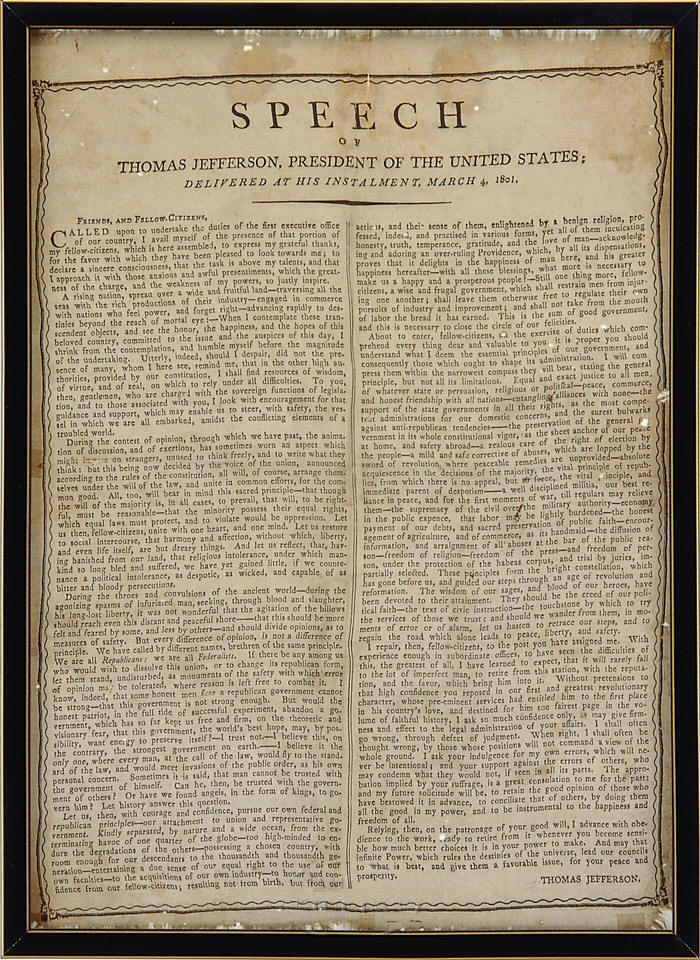|
 The
election of 1800 ushered in a new era of American
politics. It was the first significantly contested
political election, pitting incumbent patriot John Adams
and the newly formed Federalist Party against another
great patriot, Thomas Jefferson and the
Democrat-Republican Party. The election was a
humiliating defeat for John Adams and led to a bitter
break in friendship between Adams and Jefferson, which
only began to mend many years later as the ageing
patriots settled into retirement. The rupture
between Adams and Jefferson symbolically represented a
broader rupture in American political sentiment, leading
to the two party system which emerged in 1800 from the
clash of opposing ideas: the Federalist view that the
Constitution provided for inferred powers and a strong
centralized Federal government; or the Republican view
that the Constitution was intended to be strictly
interpreted, thus affording strictly limited powers.
Actions taken by Adams during his first term as
president, such as the Alien and Sedition Acts, were
seen by many as overly reaching and threatening to
personal liberty, and Jefferson's election and Adams'
defeat was a clear victory for Republicanism over
Federalism. The
election of 1800 ushered in a new era of American
politics. It was the first significantly contested
political election, pitting incumbent patriot John Adams
and the newly formed Federalist Party against another
great patriot, Thomas Jefferson and the
Democrat-Republican Party. The election was a
humiliating defeat for John Adams and led to a bitter
break in friendship between Adams and Jefferson, which
only began to mend many years later as the ageing
patriots settled into retirement. The rupture
between Adams and Jefferson symbolically represented a
broader rupture in American political sentiment, leading
to the two party system which emerged in 1800 from the
clash of opposing ideas: the Federalist view that the
Constitution provided for inferred powers and a strong
centralized Federal government; or the Republican view
that the Constitution was intended to be strictly
interpreted, thus affording strictly limited powers.
Actions taken by Adams during his first term as
president, such as the Alien and Sedition Acts, were
seen by many as overly reaching and threatening to
personal liberty, and Jefferson's election and Adams'
defeat was a clear victory for Republicanism over
Federalism.
It is among this
backdrop that Jefferson delivered his First Inaugural
Speech, on March 4, 1801. It is one of the seminal
American speeches and a remarkable effort by a truly
remarkable man. The speech is brief, just 1,725
words. In it, Jefferson sets his vision for the
nation's future. He calls for "honest friendship
with all nations, entangling alliances with none", thus
setting up a key pillar of American international
relations. He attempts to heal some of the wounds
of the 1800 election by famously declaring "We are all
Republicans. We are all Federalists." He
lays out his philosophy of restrained government, "a
wise and frugal Government, which shall restrain men
from injuring one another, shall leave them otherwise
free to regulate their own pursuits of industry and
improvement, and shall not take from the mouth of labor
the bread it has earned." He also reiterates core
political and philosophical tenets of his Republican
philosophy, such as "the supremacy of the civil over the
military authority; economy in the public expense, that
labor may be lightly burdened; the honest payment of our
debts and sacred preservation of the public faith".
Chief Justice John
Marshall administered the oath of office to Jefferson at
noon on March 4, 1801, in front of a joint session of
Congress and a crowd of more than 1,200 attendees in the
Senate Chamber of the partially built U.S. Capitol
building. The event was the first presidential
inauguration to take place in the new city of
Washington. Due to Jefferson's poor abilities as a
public speaker, not all of the attendees could hear the
new President's speech, but copies of the speech were
quickly printed and appeared as broadsides and within
newspapers and magazines of the day. His speech
was so well regarded that several prominent print makers
also produced limited edition printings of the speech on
silk fabric. While paper copies of the speech are
very rare, surviving silk broadsides of the speech are
exceedingly rare. The printer of this particular
example is not known. Signed in type "THOMAS JEFFERSON",
this remarkably intact example is one of the few of the
type to have survived more than 200 years since
Jefferson delivered his historic speech to his friends
and fellow citizens.
|

